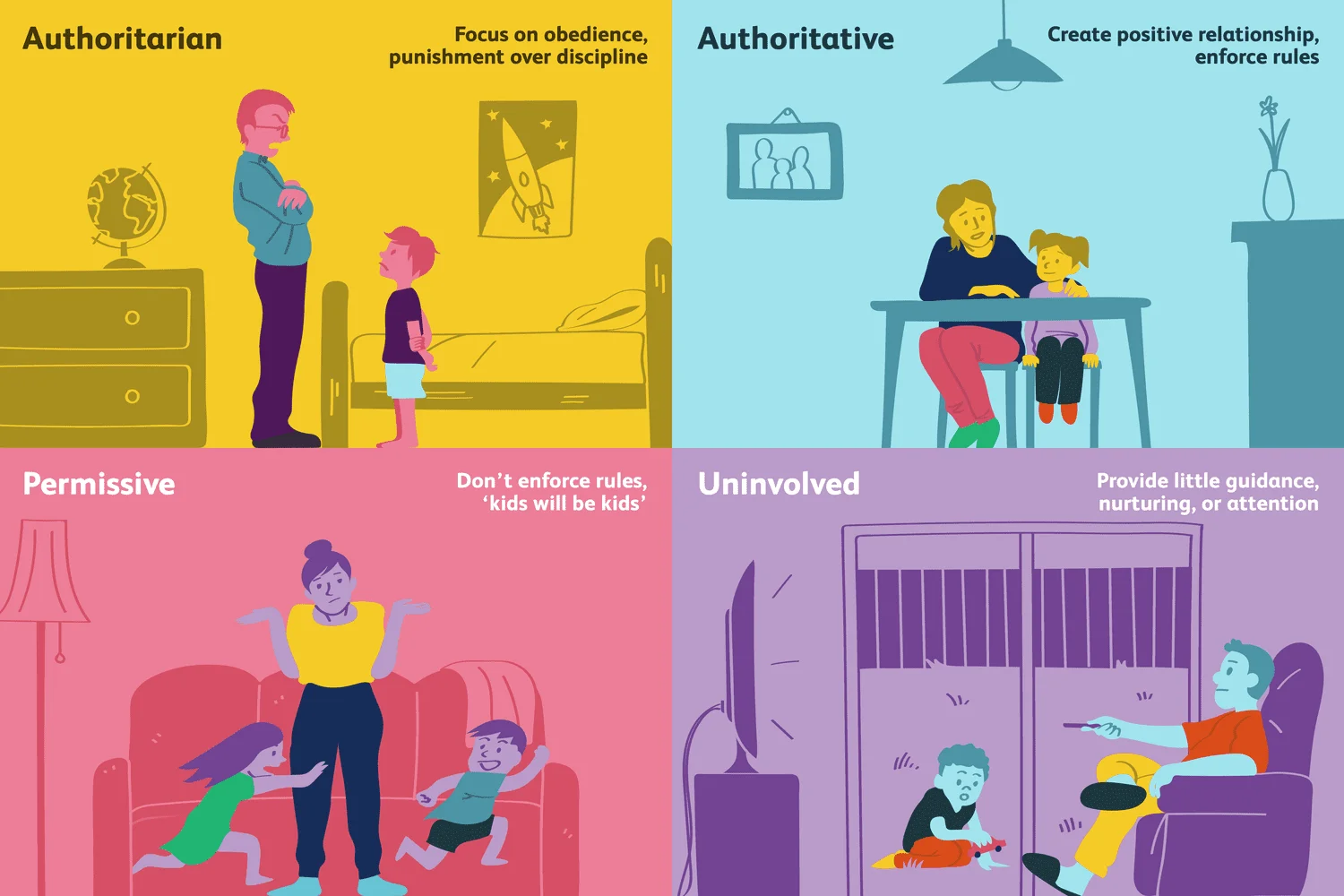Parenting styles significantly influence a child’s development and conduct. They control a child’s emotions, social capabilities, and personality in general. Focusing on different parenting techniques helps parents identify where they stand and modify them accordingly, creating an amicable environment for their children.
Each has its qualities and effects, meaning that parents should understand what method they employ for their offspring’s upbringing. Parents who mind how they raise their children create a supportive atmosphere enabling healthy growth and strong parent-child relationships.
The Four Parenting Styles
Typically, parenting styles can be grouped into four major types: authoritarian, authoritative, permissive or indulgent, and uninvolved. Each type represents a different way of raising children with different levels of involvement or demands from parents.
- Authoritarian Parenting
- Authoritative Parenting
- Permissive Parenting
- Uninvolved Parenting
Authoritarian Parenting
Authoritarian parenting refers to strictness in disciplining children. Such individuals are characterized by high expectations and inflexibility in enforcing rules. However, the approach to discipline is punitive rather than rewarding, as parents who use this style tend to believe more in the maintenance of authority.
Parents using this technique do not value or encourage open discussions with their children. In addition, it is believed that severe punishment helps in proper upbringing. However, there is no warmth and flexibility, which may strain the parent-child relationship.
Effects of Authoritarian Parenting
| Emotional Consequences | Constant criticism and lack of emotional support may lead to low self-esteem and poor confidence among children brought up by authoritarian parents. |
| Social Impact | Being used to strict hierarchical relationships, these children might struggle to build healthy relationships. |
| Behavioral Issues | As a result, children might become rebellious or lack independence because they have no opportunity to think for themselves due to pressure to conform. |

Authoritative Parenting
Authoritative parenting has been considered the most balanced and effective one. Parents practicing this style have high expectations but are also supportive. This means they allow their kids to express their views freely through dialogue.
It supports them having respect for one another and understanding since it provides a favorable environment. Antithetically, however, authoritative parents combine discipline with warmth because they want their children to understand why rules and expectations must be followed.
Effects of Authoritative Parenting
| Emotional Well-being | They usually feel loved and understood; thus, they become emotionally stable with high esteem levels. |
| Social Skills | These children are generally better socialized, so they can easily create healthy relationships that last. |
| Academic Success: | Many times, in such an environment, supportive yet structured academic success may be achieved better alongside skills for solving problems. |

Permissive Parenting
These parents are known for their indulgence and laxity. They are highly sensitive to their children’s demands but do not expect much from them. While they may be nurturing and communicative, these parents have difficulty enforcing discipline.
Doing this is triggered by the fear of conflict and wanting the child to always be happy. Without set boundaries, however, children lack self-control as well as responsibility.
Effects of Permissive Parenting
| Behavioral Problems | Being undisciplined can cause kids to exhibit behavioral problems. |
| Self-Regulation Issues | Since they are not used to following rules, they might have difficulties with self-control and decision-making. |
| Academic Challenges | Grades may suffer when no structure supports academic focus or motivation. |

Uninvolved Parenting
Parents who follow this approach are unresponsive and lack expectations. Such kind of parents seem disconnected from their child’s life whereby only few guidelines or any support offered including supervision.
The reasons for employing such strategy range from mental health issues, stress, or lack of knowledge about the needs of children.Parental disengagement has severe implications on a child’s development and welfare.
Effects of Uninvolved Parenting
| Emotional Impact | This neglect by their mothers will lead to low-esteem feelings among the children hence inability to regulate emotions. |
| Social Difficulties | Struggling to form healthy relationships among these kids could be attributed to less parental modeling or supportiveness. |
| Developmental Delays | Lack of guidance and emotional support can slow down the learning process both academically and socially. |

What’s Your Parenting Style?
The first step towards positive changes can happen when you identify your parenting style. Think about your discipline methods, how you communicate with your child, or how supportive you are towards him/her while reflecting on your interactions with your kid.
Are you more controlling than you are open to dialogues? Maybe you would rather be too kind and indifferent. Knowing all this can help in establishing which areas need one’s attention most, hence working on them to provide a better and more caring atmosphere for your child.
The Impact of Parenting Styles
Parenting styles have a significant influence on the development and behavior of children. The emotional health, social skills, or even personalities of people can be determined by the way their parents associate with them.
This is why balanced approaches such as that of authoritative parenting tend to produce the best outcomes. However, these effects may differ depending on the personality traits of each child as well as family relationships.
Parents must understand their own strategies and choose those which will lead to a supportive and nurturing environment.
Mixing Parenting Styles
It is common for parents to use a combination of different parenting techniques. They do this so that they fit their individual kids perfectly without conflicts happening. This includes blending authoritarian dictatorship with permissiveness, characterized by having some boundaries but still being flexible enough to offer emotional support.
On the other hand, contradictory approaches towards upbringing among families create confusion among kids. Followers should keep discipline while offering love when it comes to shaping babies’ lifestyles.
Advantages of Parenting Styles
| Authoritarian Parenting: | This provides children with clear expectations & structure so they feel safe.This style stresses discipline in order to make obedient children. |
| Authoritative Parenting | High expectations combined with an emotional support foster independence along with self-discipline; through open communication, this approach assists children in developing higher order thinking capacity.Offer comprehensive advice about how one can make a well-rounded judgment in any case given above |
| Permissive Parenting | Encouraging creativity and self-expression because they have more freedom to explore their interests. In this nurturing environment, a strong emotional bond between parent and child can be built. |
| Uninvolved Parenting | At the same time, uninvolved parenting may not always be ineffective, but sometimes a little aloofness can help in making children independent and self-reliant, especially if they have other sources of support. |
Can you change your parenting style?
It is possible for you to change your parenting style. The first step is admitting there is a need for change. Take some time to think about the impacts of your current approach and identify areas that need improvement.
Educate yourself on various forms of parenting, and consider advice from specialists in that field or even join support groups. Gradual implementation of changes while you remain patient will ensure gradual adaptation by both you and your child, as it does take time.
Positive transformations in your parenting technique could greatly enhance your child’s growth as well as strengthen your relationship with them.
Drawbacks in Four Parenting Styles
Understanding these constraints of each type of parental style would aid in developing an equitable and effective approach for raising children. Each style has its own advantages, but also involves several problems that must be acknowledged by parents.
Authoritarian Parenting
| Emotional And Psychological Strain: | An authoritarian parent who imposes rigid rules creates an oppressive atmosphere engendered with fear. Children may develop anxiety disorders, low self-esteem, or confidence due to constant rebuke and high expectations. |
| Creativity & independence stifled: | Strict regulations without flexibility kills the creativity of young minds and hinder personal independence while others become too reliant on authorities, thus crippling their decision-making process. |
| Poor social skills: | Lack of open communication or emotional support inhibits social capabilities development among children raised in homes where parents are controlling. Despite having friends, they still find it hard to maintain healthy relationships with them due to difficulties in expressing their emotions. |
Authoritative Parenting
| Time-Consuming and Demanding | Authoritative parenting requires an immense investment of time and effort. Balancing high expectations with emotional support and open communication can be challenging for busy parents. |
| Consistency matters a lot | Consistency in rules and expectations is crucial but hard to maintain. Inconsistencies may confuse children and undermine the effectiveness of this parenting style. |
| Cultural And Individual Differences | What works well in one cultural context or for one child may not be as effective in another. Parents must be adaptable and sensitive to their child’s unique needs and cultural background. |
Permissive Parenting
| Lack of Boundaries and Discipline | Families that are permissive usually lack structure or discipline. Failure to regulate themselves, take responsibility, or understand the consequences of their actions are common issues for these children. |
| Potential for Behavioral Issues | The lenient approach can result in behavioral problems, as children may not learn to respect rules or authority. This can lead to difficulties in school and social settings. |
| Overwhelmed Parents | Parents might find themselves overburdened by the demands made by their children if boundaries are not clearly set, leading to stress for both sides over such behavior. |
Uninvolved Parenting
| Emotional Neglect | Uninvolved parenting can lead to emotional neglect, as children receive minimal attention, support, and guidance. This can severely impact their emotional development and self-esteem. |
| Developmental Delays | The lack of parental involvement can result in developmental delays both academically and socially. Without proper encouragement, a large number of kids fail to achieve their potential thus making it necessary for them get quality guidance from childhood experts who will help them grow properly academically, physically among other areas. |
| Long-Term Consequences | The long-term outcomes of a non-engaged parenting style can include trouble developing healthy relationships as well as being unable to accomplish personal and professional goals. |
Children May Affect Their Parent’s Styles
Parents’ ways of bringing up children are significantly influenced by their personalities and behaviors. A child’s temperament, needs, and responses shape how parents interact with them.
For example, a very active child may benefit from more structure or discipline, while a more sensitive one might do better with a nurturing and supportive approach. Understanding this dynamic can help parents to be able to change their styles to meet the needs of their child, thus maintaining positive responsive relations.
Outcomes Vary in Each Parenting Styles
There are several factors that determine the outcomes of different parenting styles. These include individual characteristics of the child, family dynamics, cultural factors, etc. What is effective for one kid may not work at all for another one; therefore, it calls for flexibility on the part of the parent so that they are ready to change their approach when required.
Being attuned to your child’s unique needs and circumstances can help you implement a parenting style that best supports their growth and well-being.
Cultural Factors Play a Role
Cultural background highly influences how parents bring up children and what practices they use during these processes. Different societies have different beliefs about such things as discipline, communication styles, or how much involvement parents should have in the life of a young one.
For instance, some cultures emphasize respect for authority and strict discipline, while others prioritize emotional expression and independence. This knowledge explains why people from different cultures interpret parenting styles differently depending on the circumstances surrounding them, which also highlights the crucial role played by cultural considerations in adopting or modifying parental techniques.
Final Thoughts
Parenting styles are essential aspects of bringing up children since they shape their emotional development as well as social interaction abilities and cognitive growth. Parents who understand various approaches will be able to make informed choices regarding preferred styles.
It therefore goes without saying that each child is different and will require a different approach to thrive. A nurturing and supportive environment that ensures healthy development in children and builds strong parent-child relationships can be achieved through continued reflection and willingness to change.
FAQs about Parenting Styles
What are the main differences between the four parenting styles?
Authoritarian, authoritative, permissive, uninvolved—these four significant types of parents follow contrasting ways in which they demand or respond. The strictest ones lack warmth as they keep their children on tight leashes; some are highly demanding while remaining sensitive.
How does authoritarian parenting affect a child’s development?
Self-esteem issues, social difficulties, aggression, and other behavior problems may result from extreme control and low support, as seen with authoritarian parenting. Such principles lead the kids to have little self-confidence and dependency, hence affecting their relationship and causing them to be unable to interact frankly with others due to closed communication lines at home.
Why is authoritative parenting often considered the most effective?
Most people regard authoritative parenting to be best because it combines high expectations with emotional support and open communication. Therefore, this type of upbringing encourages independent thinking, leading to self-discipline as well as positive emotional well-being in children’s lives, evident from better performance at school followed by having stronger ties with peers.
Can parents modify their style of parenting? And if that is so, how?
Parents can change from one method to another when they recognize the need for amelioration, educate themselves on section methods at length, and seek assistance from experts. For both parents and children, it would assist them in fitting into a new, more successful parenting style by slowly introducing changes and continuing to be steadfast and patient throughout the process.
What role do cultural factors play in parenting styles?
The styles of parenting are significantly influenced by cultural factors because they have different beliefs about discipline, communication and parental responsibilities. On the other hand, this understanding gives more meaning to parental practices hence should be seen as an aspect of considering cultural background while selecting a good parenting technique or strategy.

Russell F. Jones, holding a Master in psychology from the University of Florida. He writes for Smart Parent Solutions, offering practical advice on parenting and child development. His engaging content helps parents navigate family life with confidence and ease. Russell enjoys sharing his knowledge and spending quality time with his family.
